| Construction Rating: | starstarstarstar_borderstar_border |
| Flight Rating: | starstarstarstarstar_border |
| Overall Rating: | starstarstarstarstar_border |
| Manufacturer: | Estes  |
 Brief:
Brief:
The Estes Python-4 ASRAAM Model Rocket Kit is the last of the four new models I
had to build which were introduced recently by Estes. I have already completed
the other three and have been working diligently on this one. Actually we've
been building two of them; my son and I are working in parallel, although I
tend to build a bit faster than him. The kit is one of four new Estes
"Military" kits recently released and is by far the most unique of
the group.
Construction:
As with the other new kits, you can purchase either the bagged or Launchable
version from many retailers. In the package you will find die-cut fins, body
tube, tailcone, transition, plastic nosecone, clay for noseweight, parachute,
and instructions. I was impressed with the quality of components.
I built it stock with only a few changes. I used dual Kevlar® threads for shock cord and made one other minor change. A steel leader was connected directly to the nosecone loop and a longer shock cord was tied to he swivel end of the leader. Something important to note; there were major changes in the kit compared to the instructions. The front page of the instructions has templates for body wraps, but one is the BT55 sized and the forward tube is showing as BT20. This is wrong! Apparently they printed the instructions, then changed the forward bodytube to a BT55 before shipping the production kit. This also means that references to the included transition can be ignored, as it is not used for the model.
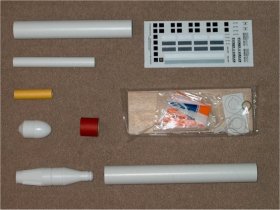
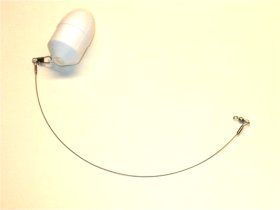
Construction began with the motor mount assembly, which went together well. I did use Kevlar® thread for the shock cord here and lengthened the elastic cord to 30 inches. Moreover, the parachute was up-sized to a purple Estes 18" chute. The new Estes tailcones are pretty sweet and allow you to use thru-the-wall fin mounting, which is a great method for building strong. The twelve fins were all dry rubbed with Elmer's Filler, then sanded to match and I put leading edges on each fin. All four canard fins were epoxied to the upper nosecone/bodytube assembly.
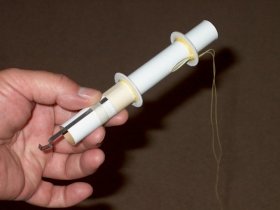
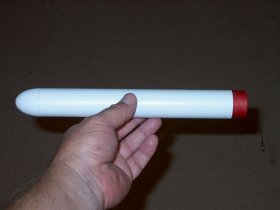
The lower fins were a bit different...You have to install card stock templates that "raise" the area around the Strake Fins. At the time I built my kit, it didn't have these in the kit, so I built it without them. A few days later, however, I saw the paper raisers in my son's kit...they are pretty cool and I was a bit bummed I didn't add them. Once the fins were mounted, I installed the "Stab" fins in front of the lower ones and clamped them in place until the glue dried. Make sure you align them well; someone else showed up to our club and had these strake fins crooked, which made his model twirl and fishtail during powered flight.
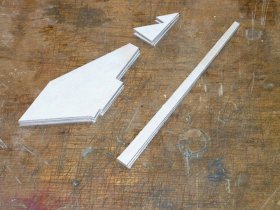
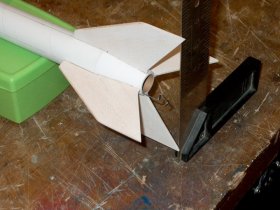
Next, I added epoxy fillets for strength. Once all twelve fins were done, I added fillets to the four upper fins on the nosecone. Finally, I used Alphaetic resin to attach the launch lugs. I used a piece of scrap balsa between the body tube and launch lug as a standoff to protect the finish from being scraped by the launch rod.
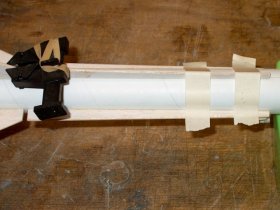
Finishing:
I spent several days priming, sanding and painting the model. Krylon gray
primer was used, followed by Krylon White for the lower body tube section and
Krylon Medium Gray for the upper body tube. The upper fins were painted first
in white, then masked a couple days later for the gray. The rocket flew without
decals for it's first three flights, but I did eventually put them on and it
looks like a new model. One item to note on the finishing...the lower bodytube
is actually done in very light gray, almost a "dirty white" color. I
did not notice this until I had already finished the lower BT. For this reason,
I didn't use the supplied white stripes on the lower BT, as they would not have
shown.
Construction Rating: 3 out of 5
Flight:
IT was time to launch. All of the other three new Estes Military kits had
already gone up several times, so it was time to give the ASRAAM its chance. I
prepped the Python-4 with a C6-5 for it's first flight, added tissue, and
packed the chute. It was placed on the pad and the countdown was on. It has a
very unique look sitting on the pad and those dual canard fins at the nose made
it look pretty tough! It looked even better when the button was pressed and the
ASRAAM rose off the pad under power. The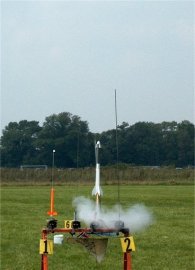 flight was straight and true, but late on the ejection.
flight was straight and true, but late on the ejection.
Recovery:
Ejection happened on it's way down, but the parachute deployed and the rocket
landed safely. Upgrading the parachute was a good choice as the model appeared
to be a bit heavier than it should, probably due to the extra paint I used to
get a good finish. I prepped the model and launched it once more, this time on
the C6-3. It was a perfect flight, with ejection happening right at apogee and
it landed without a scratch. I had flown all four new models several times in
one day and wound up putting three more flights on this bird. The model flies
great on C6-3s, but this is one I would build again on 24mm power, just so I
could use a variety of motors and get a bit more altitude. I may try an 18mm
RMS...it should do well there!
Flight Rating: 4 out of 5
Summary:
The Estes Python-4 ASRAAM Model Rocket is a challenging, yet fun kit to build.
With it's swept back fins and long bodytube, it has a graceful yet
meant-for-business look about it. A few items needed upgraded during
construction, otherwise the kit was built stock. Be careful of the instruction
cut-out bodytube wraps and don't follow the directions for those, but rather
use the lower BT wrap for marking the upper tube. You also may consider
upgrading it to a 24mm motor, as it weighs nearly 4oz dry. Still, it is a good
flier right out of the box, designed very strong with good quality parts.
Moreover, it has a real clean look that's an eye catcher at the field. I
recommend the kit to anyone interested in trying one of the most unique models
I have built to date, the ASRAAM Python-4.
Overall Rating: 4 out of 5
Other Reviews
- Estes Python-4 ASRAAM By Alex Rothchild
Brief: This is a low power, single stage military style rocket. It flies on B and C power and uses a 1/8 inch lug. It includes a tail cone and uses a 12 inch chute for recovery. Construction: I received the kit as a gift when I was first getting into rocketry, so it probably wasn't a great second or third kit for me. It came in a "Launchable" box and included many ...
 |
 |
Flights
Sponsored Ads
 |
 |











